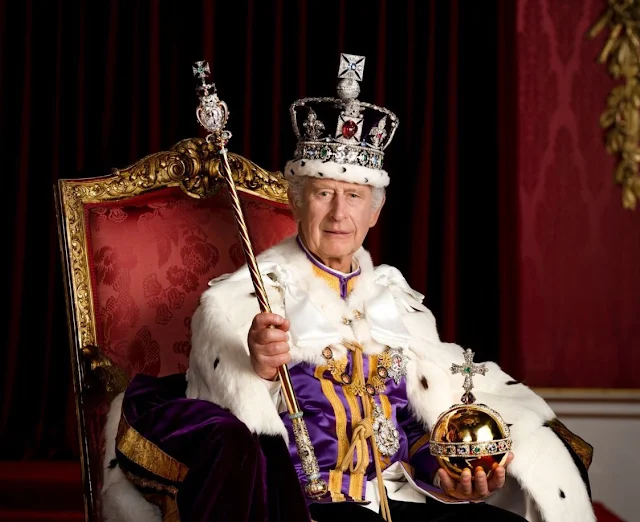Featured
- Get link
- X
- Other Apps
The Royal Rumour Mill: Navigating Conspiracy Theories Amidst Concerns Over King Charles's Health
In the realm of royalty, intrigue is as common as a crown, but amidst whispers of uncertainty, conspiracy theories are swirling like a tempest in a teapot.
As concerns mount over the health of King Charles, the digital landscape is abuzz with speculation and hearsay, casting a shadow over the monarchy's stability.
On platforms like X (formerly Twitter), the hashtag #RoyalAnnouncement has taken flight, fueled by mentions of flags flying at half-mast in government buildings—a cryptic sign that has sent the rumour mill into overdrive.
The saga begins with whispers of King Charles's recent health woes, stemming from a prostate surgery performed at The London Clinic. While Buckingham Palace swiftly moved to allay fears, confirming the absence of prostate cancer, a cloud of uncertainty lingers. Reports of a "separate issue of concern" detected during the procedure only added fuel to the speculative fire, prompting the monarch to scale back public appearances while maintaining a steadfast presence in his duties. Yet, the plot thickens with each passing day.
On March 15, King Charles's departure from Windsor Castle following news of a friend's passing triggered a fresh wave of conjecture. Add to the mix his recent meetings with diplomats and dignitaries, and the stage is set for a Shakespearean drama of epic proportions.
#TheOnguruReport
— 𝕿𝖍𝖊 𝕺𝖓𝖌𝖚𝖗𝖚 𝕽𝖊𝖕𝖔𝖗𝖙™ (@TheOnguruReport) March 18, 2024
The #RoyalAnnouncement is going to be about one of 3 things:
1. King Charles abdicating. Brings us here: https://t.co/hMCVnptd5s
2. Kate's failing health. Brings us here: https://t.co/867Zkf4vF3
3. William & Kate divorcing. Brings us here: https://t.co/Ccmq1k1cZz pic.twitter.com/4YBuTiVz4J
But amidst the chaos, it's the whispers on social media that echo loudest. From claims of the monarch's demise to wild theories involving abdication or even the untimely demise of Princess Kate, the digital realm has become a breeding ground for speculation. With Saint Patrick's Day festivities providing a backdrop, some users have drawn parallels to Princess Diana's Irish heritage, weaving a narrative as complex as any royal lineage.
Why do these big media channels want to make us believe these are Kate and William?
— Dr Mudasir 2.0 (@MudasirKabir) March 19, 2024
But as we can see they are not Kate or William...
Why???#KateMiddleton #RoyalAnnouncement pic.twitter.com/9ni9XmMoR1
Enter the "Popapologists," sisters Lauren and Chen, whose TikTok musings on Princess Kate's health have added another layer to the intrigue. With the Duchess of Cambridge's recent absence from public events and a curious apology for a palace-released photo, the duo's commentary has only served to stoke the flames of curiosity.
Yet, in the age of information overload, separating fact from fiction has never been more critical. While conspiracy theories may provide a fleeting thrill, the consequences of unchecked speculation can be far-reaching. Misinformation, once unleashed, can spread like wildfire, eroding trust and sowing discord within society's fabric.
BBC on standby for royal announcement pic.twitter.com/3bQ1PWZSHv
— interessingworld (@interssingworld) March 17, 2024
As the BBC stands poised on standby (apparently), awaiting a potential royal announcement, it's a sobering reminder of the power—and peril—of the digital age. In a world where truth is often obscured by the shadows of rumour, navigating the treacherous waters of conspiracy theories requires a discerning eye and a healthy dose of scepticism.
TMZ who published the first faked picture of Kate in the car with Carole Middleton just released this video of Kate and William , only the woman is Not Kate.#KensingtonPalaceEXPOSED #KateGate #BuckinghamPalace #PrinceWilliamEXPOSED #RoyalAnnouncement pic.twitter.com/nuKtQ3mKOb
— Mahipal singh Rathore (@Mahipal881) March 19, 2024
So, as the saga of King Charles's health unfolds, let us tread carefully, lest we become unwitting pawns in a game of digital deception. For in the realm of the Royals, the line between fact and fiction is often as thin as a royal decree, and the consequences of misinformation are fit for a tragedy of Shakespearean proportions.
- Get link
- X
- Other Apps
Popular Posts

Who’s Nailin’ Paylin?
- Get link
- X
- Other Apps

A selection of Kenyan women
- Get link
- X
- Other Apps



Comments